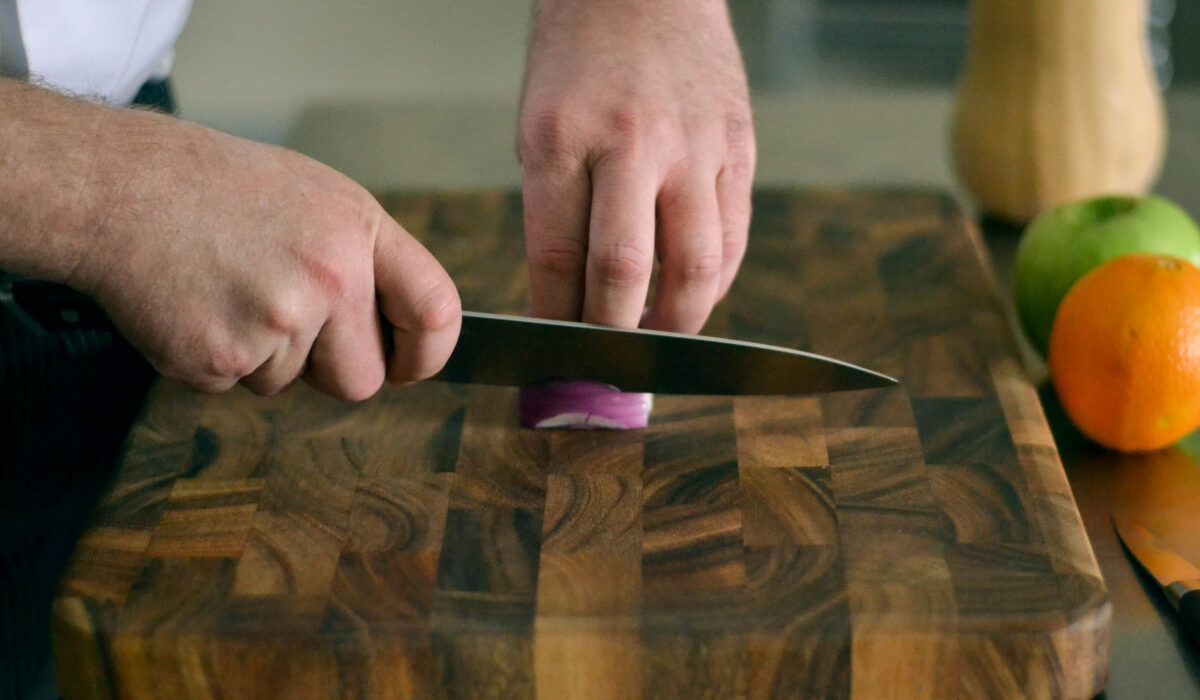Choosing the right kitchen knife can be a daunting task, especially when faced with options like the German knife vs Santoku. Both knives have their origins in rich culinary traditions and offer unique features that cater to different cooking styles. Understanding the differences and similarities between these two types of knives can help you make an informed decision, enhancing your culinary experience.

Understanding the German Knife
German knives are renowned for their robust design and versatility. Typically crafted from high-carbon stainless steel, these knives are known for their durability and strength. German knives are often heavier, providing a sturdy feel in the hand which many chefs prefer for tasks requiring more force.
Features of German Knives
German knives feature a curved blade, making them ideal for a rocking cutting motion. This design is perfect for chopping, mincing, and slicing, offering precision and control. The bolster, a thick junction between the blade and the handle, adds balance and safety, preventing your hand from slipping onto the blade.
Popular German Knife Brands
Brands like Wsthof and Zwilling are synonymous with German knives. They have a longstanding reputation for producing high-quality knives that are trusted by professional chefs worldwide. The history of Zwilling knives is a testament to their commitment to excellence.
Exploring the Santoku Knife
The Santoku knife, originating from Japan, is celebrated for its precision and versatility. The word Santoku translates to three virtues, referring to its ability to handle slicing, dicing, and chopping.
Features of Santoku Knives
Santoku knives feature a flat blade with a sheeps foot tip, which minimizes rocking motion and promotes a straight cut. This design is particularly beneficial for fine slicing and dicing, making it a favorite for preparing vegetables and fish. The blade often has a granton edge, which prevents food from sticking.
Popular Santoku Knife Brands
Brands like Shun and Global are well-known for their Santoku knives, offering precision and balance. These knives are crafted with meticulous attention to detail, reflecting the Japanese tradition of knife-making.
Comparing German Knife vs Santoku
Blade Design and Material
German knives are typically made from high-carbon steel, providing strength and resistance to corrosion. The curved blade design is conducive to a rocking motion, ideal for chopping. In contrast, the Santoku knifes flat blade is perfect for up-and-down chopping motions, excelling in precision tasks.
Weight and Balance
German knives are generally heavier, providing a balanced and sturdy feel. This weight can be advantageous for tasks that require more force. On the other hand, Santoku knives are lighter, which some chefs prefer for precise cutting tasks.
Versatility in the Kitchen
Both knives are versatile, but they shine in different areas. German knives are excellent all-rounders, suitable for a wide range of kitchen tasks. Santoku knives, however, excel in precision tasks, especially when dealing with delicate ingredients.
Choosing the Right Knife for You
Cooking Style and Preferences
Your choice between a German knife vs Santoku should reflect your cooking style. If you prefer robust and versatile tools, a German knife might be the right choice. If precision and finesse are more important, a Santoku knife could be your ideal kitchen companion.
Budget Considerations
Both types of knives are available in a range of prices. Its essential to consider your budget while ensuring you invest in a high-quality knife that will last.
Maintenance and Care
Proper maintenance is crucial for the longevity of your knives. Regular sharpening and appropriate cleaning are necessary. For more detailed tips, you can visit how to clean your Wsthof knives.
Conclusion: Making an Informed Decision
Deciding between a German knife vs Santoku ultimately depends on your personal preferences and cooking needs. Both knives offer unique advantages that cater to different culinary tasks. By understanding their features and benefits, you can choose the knife that will best enhance your kitchen experience.

Frequently Asked Questions
What tasks are German knives best suited for?
German knives are versatile and robust, making them suitable for a wide range of tasks including chopping, slicing, and mincing.
Are Santoku knives good for beginners?
Yes, Santoku knives are excellent for beginners due to their lightweight design and precision, making them easy to handle.
How often should I sharpen my kitchen knives?
Its recommended to sharpen your knives every few months, depending on usage, to maintain their effectiveness. For more tips, check out how to test German knife sharpness.
This article contains affiliate links. We may earn a commission at no extra cost to you.


